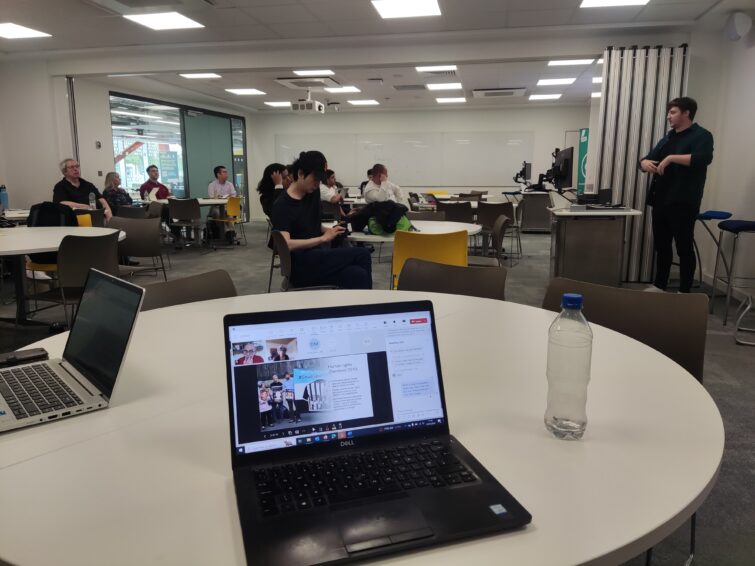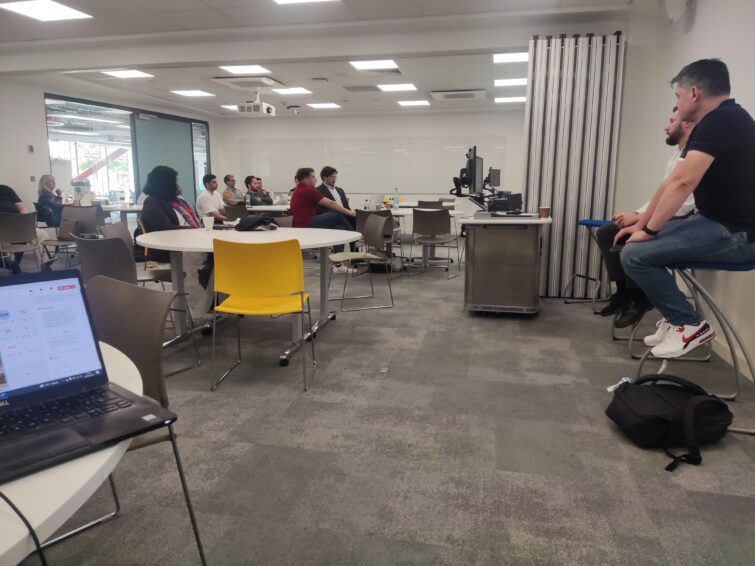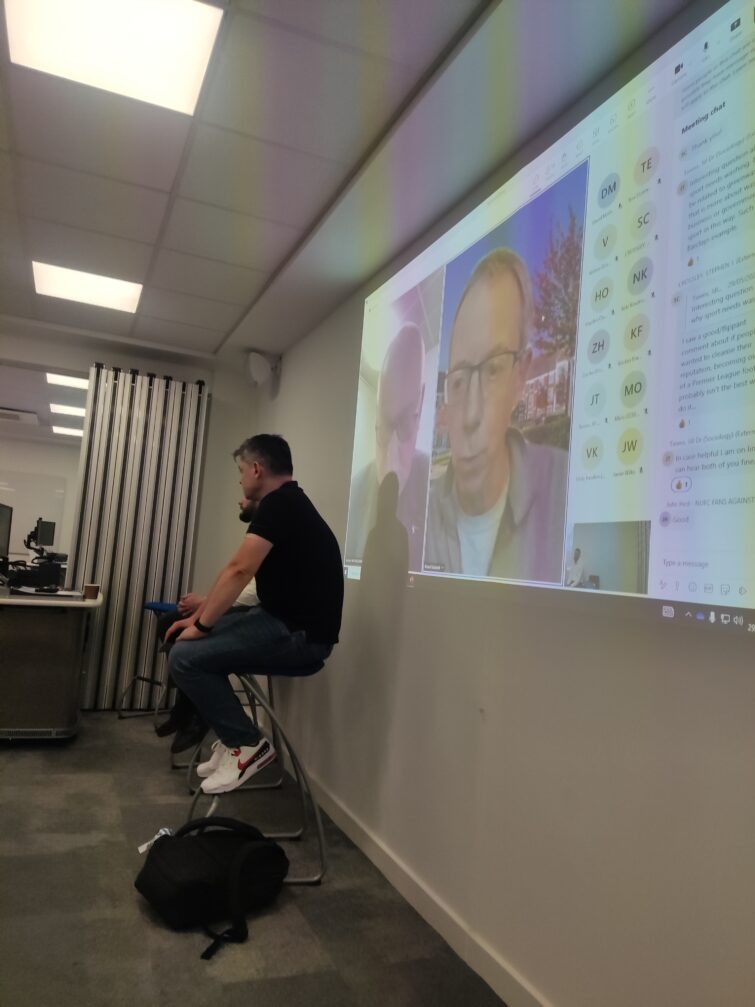First major international event on sportswashing hosted by the Centre for Communication & Culture at Loughborough University, May 2024

In May 2024, the CRCC hosted an international event on the topic of sportswashing at the Loughborough University London campus. It drew together scholars from a range of disciplines – including communication and media, politics, international relations, marketing, sociology and area studies – and countries, alongside journalists and representatives from activist organisations.
The opening session discussed the rise of the term since 2015 and pointed to the growing significance of sport for both commercial and state organisations. Here, it was noted that sport is not only linked to well-established, and highly valued, forms of community – local, regional, national and trans-national – but is one of the few forms of media content that can still generate large, passionate audiences in an era of media fragmentation.
A series of panels were then held that addressed the following broad issues:
Views of audiences and attendees
While the term sportswashing has generated an awful lot of media and political debate over the last decade, there has been relatively little research into ordinary people’s attitudes towards the practice. In the opening panel, two papers, from Tom Taylor and Owen Evens (both University of Brighton), addressed this lacuna by presenting evidence from interviews with football fans, including those who had attended the 2022 Qatar (football) World Cup.
Interestingly, all those interviewed were aware of the term and many were critical of the practice. However, at the same time they felt relatively helpless to challenge any developments and ethical concerns were generally overridden by the excitement of following the tournament once the football got underway. Indeed, these views were supported by Beth Dann’s (University of Sheffield) paper, which noted how media reports of the same event followed a similar pattern, with initial discussions of human rights issues, largely supplanted by coverage of the matches and participants as the tournament progressed.
Another key insight came from ethnographic data collected at the tournament itself, which focused on more positive responses from some attendees. These people noted that while they had reservations about the host country’s treatment of workers, women and minorities, they enjoyed their engagements with other fans, felt safe travelling in the country and welcomed the range of facilities available to them.

Neo-orientalism and non-Western views
A second key issue concerned the extent to which the literature on sportswashing often replicates forms of (neo)Orientalism. That is, critics of the practice almost always come from the west and target their criticisms at non-Western actors. This doesn’t mean falling into a form of moral relativism but should involve acknowledging a number of important factors. First, that Westen-based organisations, notably sporting authorities and commercial sponsors, are often involved in making decisions about who hosts sporting events. This was a point made by Adam Talbot (University of the West of Scotland) in his paper on the ethics of ‘sportswashing’.
Second, Western states often support such decisions and, just as importantly, have major relationships with these states outside of sport. In other words, it seems harsh holding sport to different ‘rules’ to other major industries. Third, we cannot assume that non-Western states hosting of sporting events is always designed to appeal to, or placate, Western publics. In relation to this final issue, two contrasting case studies were presented. The first, presented by Itamar Dubinsky (Ben-Gurion University of the Negev, Israel & Leonard Davis Institute for International Relations, The Hebrew University of Jerusalem), focused on Rwanda and demonstrated the extent to which the countries involvement in sport is designed to increase its visibility both in Africa and beyond and engage high profile actors, both within sport and politics. The second, from Vitaly Kazakov (Aarhus University), offered a very contrasting view by focusing on Russia’s hosting of the 2014 Winter Olympics and 2018 (football) world cup. In these cases, it was argued that hosting these events was primarily designed to engage audiences in Russia and the former USSR, demonstrating the country’s economic and political power and possibly acting as a precursor to the subsequent invasion of, first, Crimea and, then, Ukraine.
Longer-term perspectives
The third set of arguments called for the importance of adopting both longer-term and broader perspectives when trying to make sense of sportswashing. In the first place, the use of sports by states has a long history and should not only be seen as the preserve of men’s sport. Indeed, while attempts to ‘sportswash’ in relation to women’s sport was most noticeably highlighted in relation to the 2023 (football) world cup, Jean Williams’ paper noted that women’s football has long been used by both states and the sport’s authorities as a tool to pursue both economic and reputation management objectives.
In a similar vein, the chief football writer of the Independent newspaper, Miguel Delaney, provided an illuminating overview of the changes that have transformed football in Britain in the past four decades. In particular, he noted the failure of authorities to protect the community-based foundations of the sport and subsequently their inability to manage what the sport has become after being targeted by both commercial enterprises and subsequently states.

Resistance is (not) futile
Notwithstanding the attempted co-optation of many elite sports by powerful interests, two participants on the closing round-table pointed to the continuing importance of grassroots and activist organisations in challenging these shifts.
John Hird of the Newcastle United Fans Against Sportswashing collective talked passionately about the range of bottom-up activities (protests, talks, publicity stunts, discussion groups) that have taken place and how the group continues to try and hold those in the city to account. He also noted the importance of building networks both within the UK, where there is a growing dis-satisfaction with how sports are being governed, and beyond.
Finally, Alex Carlen of the activist group FairSquare provided a thoughtful and engaging overview of his organisation’s activities and ended the workshop on a more hopeful note. He argued that, for all its flaws, the debate around sportswashing has focused much more attention on the activities of states in relation to sport and, in the process, made their rights violations, and hypocrisy, more visible.
For more information about the event or plans to produce an edited collection on the topic, please contact Dr Michael Skey (m.skey@lboro.ac.uk).